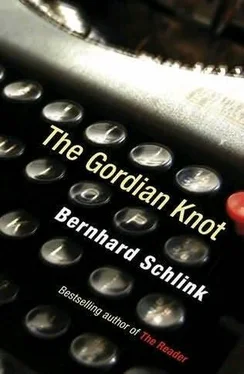Once every movement no longer hurt and he could walk, bend over, and stretch, he felt anger and hatred. They’ve taken Françoise away, they’ve beaten me to a pulp, killed my cats, ransacked my house and my office. They used me, and anything I didn’t give them of my own free will they took anyway. If I let them do that, I’m not worth more than a stone or garden hose or cigarette butt. And if it’s the last thing I ever do, I’m going to beat the hell out of Bulnakov! I’ll blow him up in his car, him and those bastards who did this to me!
He pictured what he would do to them, and how. There was nothing original in his fantasies, just images of avenging heroes from the movies, but when the images ran out and he began to think more clearly, he realized how little he knew. How many people were working for Bulnakov? Where did Bulnakov live, what did he do all day?
On Monday morning Georg drove to Marseille by way of Cadenet. It was a detour, but it took him past Françoise’s place. He kept hoping for a sign, a hope he told himself was futile, and for which every disappointment was a confirmation. He no longer went to her apartment.
But her car was there: parked the way she always parked it on the other side of the narrow street, at an angle, only the left wheels on the asphalt, the right ones against the hedge. He pulled up outside the front gate, hurried up the stairs, ran over the gravel, and pressed down on the latch. She never locked the door when she was home. But today the door was locked, and when Georg stepped back confused, he saw that the curtains were still drawn. He knocked on the door, waited, and knocked again.
A truck honked its horn as it carefully edged past Georg’s car, which was blocking the road. Somebody called to him from a window in the villa, and he looked up.
“Can I help you?”
“I’m looking for Mademoiselle Kramsky. I see her car is here.”
“Mademoiselle Kramsky? She moved out. About a week ago. Ah, the car is back, is it? Well, it’s my car, not hers. She rented it from me until today.”
“But you said that it was a week ago that she…”
“One moment, I’ll be right down.”
Georg waited by the door. An elderly gentleman in a dressing gown came out.
“Good morning. You are a friend of Mademoiselle’s, I believe; I’ve seen you before. She rented the apartment and the car from me. She wanted to keep the car a little longer so she could go out driving for a few days.”
“Do you have her new address?”
“No.”
“Then where do you forward her mail?”
“Mail? She never got any.”
“I’m sorry to be so insistent, but this is really important. You can’t just rent a car like that without having an address.”
“That’s enough of that, young man. Mademoiselle Kramsky lived here quite a while, and I know whom I can trust. As you said yourself, the car is parked right outside. Good day!”
Georg walked slowly down the stairs and stopped in front of the gate. He took a deep breath. This time the disappointment was not just a confirmation, it hit him full force. His anger was back. He would go to Bulnakov’s office and confront him.
He parked his car near the statue of the drummer boy and walked up the rue d’Amazone. The brass plaque next to the bell was no longer there-it was the right building, but the plaque was gone. A man in white overalls came walking up the street, told Georg the door was open, and went inside. Georg followed him up to the third floor. The door stood open. Here, too, Bulnakov’s plaque was gone, and the painters were at work.
“What’s going on?” Georg asked the man he had followed up the stairs.
“What does it look like? We’re painting.” He was a young man with a cheerful, cheeky face, who had been whistling all the way up the stairs.
“What about the people who had the office here?”
“Monsieur Bulnakov? He’s the one who hired us.” He laughed. “He paid us too.”
“Do you know the landlord or the owner of the building?”
“Oh, are you thinking of renting the place? Monsieur Placard lives on the ground floor.”
Georg knew what Monsieur Placard would say: Monsieur Bulnakov hadn’t left a forwarding address or any other contact information. Saturday afternoon he and some other men had vacated the premises. “He gave me all the furniture. My son and I brought it down to the cellar. Might you be interested in it?”
“In office furniture?” Georg shook his head and left. Like a nightmare, he thought, but like a nightmare it’s gone away.
BUT NOW HIS WHOLE LIFE TURNED into a nightmare.
It was at the office that Georg first noticed that everything had changed. The Mermoz job, for which he had been beaten up, had not only been the last in a series, but the very last. No more jobs came. He called Mermoz and asked what the matter was, but was put off. When he called again, he was told in no uncertain terms that Mermoz was no longer interested in his services. All his major accounts began to dry up, one after the other. Within a month his agency was ruined. Not that there weren’t any translation jobs, but there wasn’t even enough work to cover the rent or pay the secretary.
Then his problems with the police began. They had initially accepted that he didn’t know who had attacked him or why. The two officers who took his statement had been pleasant and sympathetic. But a few weeks later two other officers showed up. They wanted to know the exact particulars of the accident, the route he’d taken, what he had in his car. They asked him for his opinion about the attack: If he were going to rob anyone, would he choose to rob someone driving an old Peugeot? Why he had moved from Karlsruhe to Cucuron? What did he do for a living? What had he done for a living in Germany? No, they couldn’t drop the matter. They kept coming back, sometimes two officers, sometimes one, always asking the same questions.
The policeman in Cucuron also had his eye on him. The little town had only one policeman, everybody knew him and he knew everybody. Nobody held it against him when he took it upon himself to have a car towed that someone had left in the middle of the street in a drunken stupor, or if he stopped someone from burning trash in their backyard, or had a door broken down for the bailiff. Can one blame a dentist if he drills and there is pain? And like a dentist, Cucuron’s policeman didn’t inflict pain without good reason.
At first Georg wasn’t particularly concerned when the policeman didn’t return his greeting. I suppose he didn’t see me or didn’t recognize me, he thought, or maybe his mind was elsewhere, or perhaps he mistook me for one of those tourists passing through Cucuron.
One day he was sitting at a table outside the Bar de l’Étang. Gérard and Nadine were with him, and the bartender had come out to sit with them. The other tables were full too, as the morning market was over. He had parked his car where he always did, and where everyone else did too: among the old plane trees by the pond.
“Is that your car?” the policeman asked, towering before Georg and pointing at his yellow Peugeot.
“It is, but…” Georg wanted to reply that he knew well enough it was his car, and ask him what this was all about.
“You can’t leave your car there.”
Georg was more taken aback than outraged. “Why not? Everyone parks there.”
“I repeat, you’ll have to move your car.” The policeman had raised his voice, and everyone at the surrounding tables was watching and listening. Georg looked at the curious and indifferent faces. The bartender got up and went back behind the bar. Gérard stirred his espresso, avoiding Georg’s eyes. Nadine was fidgeting with her bag.
Georg controlled himself. “Could you tell me why I can’t leave my car there?”
Читать дальше












